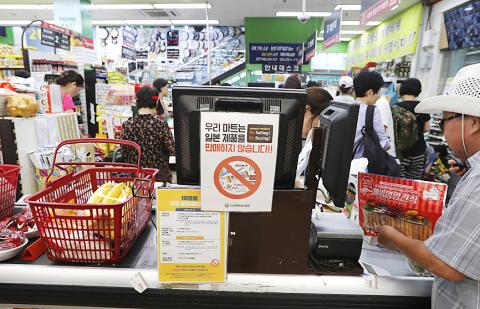Japan yesterday said that it does not plan to retract or renegotiate its stricter controls on high-tech exports to South Korea, a day after South Korean President Moon Jae-in urged that the issue be resolved through diplomacy.
Tokyo last week tightened the approval process for Japanese shipments of photoresists and other sensitive materials to South Korean companies.
Such materials can only be exported to trustworthy trading partners, Japanese officials have said, hinting at security risks without citing specific cases.

Photo: AP
They have rejected suggestions that the move was driven by worsening ties between the two nations related to historical issues.
“The measure is not a subject for consultation and we have no intention of withdrawing it either,” Japanese Chief Cabinet Secretary Yoshihide Suga told a news conference.
He was responding to Moon’s appeal for a diplomatic solution thorough “sincere” bilateral discussions, urging Tokyo to withdraw what he described as a politically motivated measure.
Moon on Monday said that Seoul would be forced to take countermeasures if the restrictions on materials used mainly in semiconductors and displays cause damage to South Korean companies, as the curbs have raised concern over possible disruptions for South Korean manufacturers and global supply chains.
The South Korean Ministry of Trade, Industry and Energy said that Seoul plans to file a complaint with the WTO.
Japan’s trade measures followed South Korean court rulings ordering Japanese firms to compensate South Korean plaintiffs for forced World War II labor.
The export restrictions cover fluorinated polyimides, which are used in organic light-emitting diode screens for TVs and smartphones, as well as photoresist and hydrogen fluoride, used for making semiconductors.
Japanese officials have said that those chemicals are sensitive materials that could be used in fighter jets, radars and chemical weapons, and the decision to tighten controls was based on a lack of trust that posed a risk to national security.
Japanese Prime Minister Shinzo Abe and his aides have hinted that there might have been illegal transfers of sensitive materials from South Korea to North Korea.
South Korea has summoned a Japanese embassy official to protest Abe’s suggestion that it could not be trusted to faithfully implement sanctions against the North, South Korean Ministry of Foreign Affairs spokesman Kim In-chul said.
South Korean Minister of Trade, Industry and Energy Sung Yun-mo said that an “emergency inspection” found no sign of illegal transactions.

AIR SUPPORT: The Ministry of National Defense thanked the US for the delivery, adding that it was an indicator of the White House’s commitment to the Taiwan Relations Act Deputy Minister of National Defense Po Horng-huei (柏鴻輝) and Representative to the US Alexander Yui on Friday attended a delivery ceremony for the first of Taiwan’s long-awaited 66 F-16C/D Block 70 jets at a Lockheed Martin Corp factory in Greenville, South Carolina. “We are so proud to be the global home of the F-16 and to support Taiwan’s air defense capabilities,” US Representative William Timmons wrote on X, alongside a photograph of Taiwanese and US officials at the event. The F-16C/D Block 70 jets Taiwan ordered have the same capabilities as aircraft that had been upgraded to F-16Vs. The batch of Lockheed Martin

GRIDLOCK: The National Fire Agency’s Special Search and Rescue team is on standby to travel to the countries to help out with the rescue effort A powerful earthquake rocked Myanmar and neighboring Thailand yesterday, killing at least three people in Bangkok and burying dozens when a high-rise building under construction collapsed. Footage shared on social media from Myanmar’s second-largest city showed widespread destruction, raising fears that many were trapped under the rubble or killed. The magnitude 7.7 earthquake, with an epicenter near Mandalay in Myanmar, struck at midday and was followed by a strong magnitude 6.4 aftershock. The extent of death, injury and destruction — especially in Myanmar, which is embroiled in a civil war and where information is tightly controlled at the best of times —

Taiwan was ranked the fourth-safest country in the world with a score of 82.9, trailing only Andorra, the United Arab Emirates and Qatar in Numbeo’s Safety Index by Country report. Taiwan’s score improved by 0.1 points compared with last year’s mid-year report, which had Taiwan fourth with a score of 82.8. However, both scores were lower than in last year’s first review, when Taiwan scored 83.3, and are a long way from when Taiwan was named the second-safest country in the world in 2021, scoring 84.8. Taiwan ranked higher than Singapore in ninth with a score of 77.4 and Japan in 10th with

China's military today said it began joint army, navy and rocket force exercises around Taiwan to "serve as a stern warning and powerful deterrent against Taiwanese independence," calling President William Lai (賴清德) a "parasite." The exercises come after Lai called Beijing a "foreign hostile force" last month. More than 10 Chinese military ships approached close to Taiwan's 24 nautical mile (44.4km) contiguous zone this morning and Taiwan sent its own warships to respond, two senior Taiwanese officials said. Taiwan has not yet detected any live fire by the Chinese military so far, one of the officials said. The drills took place after US Secretary